Labels
- Bishops
- Chant
- Children
- Clerical abuse
- Conservative critics of the EF
- Correctio Filialis
- FIUV Position Papers
- Fashion
- Freemasonry
- Historical and Liturgical Issues
- Islam
- Liberal critics of the EF
- Marriage & Divorce
- Masculinity
- New Age
- Patriarchy
- Pilgrimages
- Pope Francis
- Pro-Life
- Reform of the Reform
- Young people
Friday, August 31, 2018
Photos from the Walsingham Pilgrimage
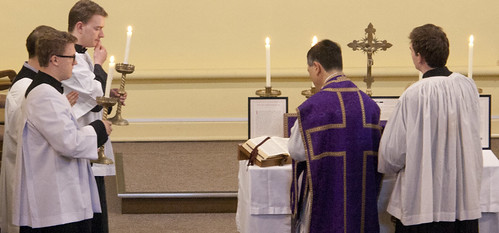
Early on Friday morning last week, about 60 pilgrims set out from Ely to walk about 60 miles to Walsingham. Our intention was the conversion of England, and the means we were employing to bring this about were principally prayer and penance. We didn't go by bus. We walked, because it is more difficult to walk. We wanted to do it the hard way.
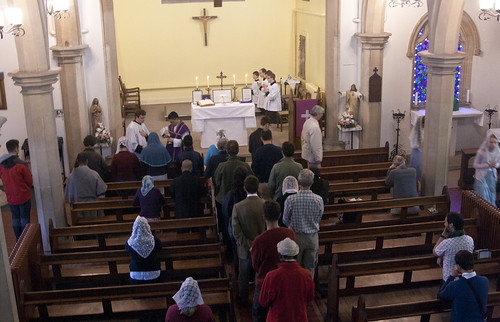
We had the Votive Mass for Pilgrims before we left Ely, in St Ethelreda's Church. It was a Sung Mass with chant: we had with us an excellent chant schola, led by Gwilym Evans, a seminarian of the FSSP.
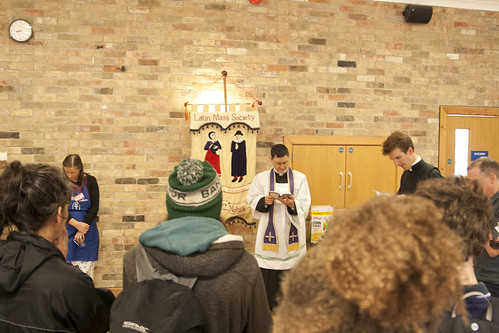
The Pilgrims' Blessing (from the Roman Ritual) was given by one of our chaplains, Fr Michael Rowe from Perth, Australia. Our other chaplain was Fr James Mawdsley FSSP.
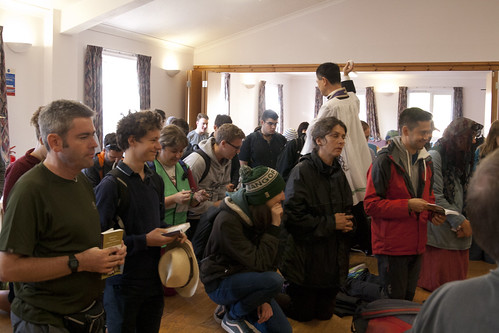
Tuesday, August 28, 2018
Viganò and the pyramid of lies
The Viganò story broke on the morning of the third day of the Latin Mass Society's Walking Pilgrimage to Walsingham. I started seeing it on social media at a rest-stop about 5 miles from the shrine, as I was tweeting our progress. So I come a little late to the party, and would much rather be writing about other, and more edifying, matters. But here are some thoughts, now I have got home.
Catholics, indeed everyone interested in the Church, stand in dazed awe at an audacious pyramid of lies. Broader, comprehensive lies support detailed, lesser lies, in a intricate pattern, soaring to vast heights and covering an extensive territory, something like the fortress of Sauron, in Tolkien's Lord of the Rings: wall upon wall, battlement upon battlement, black, immeasurably strong, mountain of iron, gate of steel, tower of adamant.
A small but indefatigible cadre of Catholic commentators (Austen Ivereigh, Massimo Faggioli et al.) are suggesting to us that this fortress of falsehood is to be found in Viganò's own 'testimony'. They see a pattern of deceit, motivated by frustrated ambition, and no doubt other unworthy things, being supported by a 'team' including various persons they do not like. If this were the case, the situation would be extremely worrying. This interpretation recruits as Viganò's co-conspirators prelates of far greater dignity and popularity than Archbishop Viganò himself. It is impossible to think of a public challenge to a Pope's authority as elaborately planned or supported by such senior churchmen in modern times, and coming on top of the McCarrick case and the Grand Jury report, the implications are dizzying. One could only say that, on this view, one statement at least of Viganò's memorandum is true: that the cracks perceived by Pope Paul VI as letting the smoke of Satan into the Church have become chasms.
Catholics, indeed everyone interested in the Church, stand in dazed awe at an audacious pyramid of lies. Broader, comprehensive lies support detailed, lesser lies, in a intricate pattern, soaring to vast heights and covering an extensive territory, something like the fortress of Sauron, in Tolkien's Lord of the Rings: wall upon wall, battlement upon battlement, black, immeasurably strong, mountain of iron, gate of steel, tower of adamant.
A small but indefatigible cadre of Catholic commentators (Austen Ivereigh, Massimo Faggioli et al.) are suggesting to us that this fortress of falsehood is to be found in Viganò's own 'testimony'. They see a pattern of deceit, motivated by frustrated ambition, and no doubt other unworthy things, being supported by a 'team' including various persons they do not like. If this were the case, the situation would be extremely worrying. This interpretation recruits as Viganò's co-conspirators prelates of far greater dignity and popularity than Archbishop Viganò himself. It is impossible to think of a public challenge to a Pope's authority as elaborately planned or supported by such senior churchmen in modern times, and coming on top of the McCarrick case and the Grand Jury report, the implications are dizzying. One could only say that, on this view, one statement at least of Viganò's memorandum is true: that the cracks perceived by Pope Paul VI as letting the smoke of Satan into the Church have become chasms.
Thursday, August 23, 2018
Follow the LMS Walsingham Pilgrimage
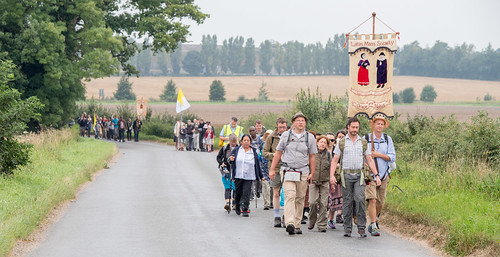
Blogging this week has been pushed aside by preparations for the LMS Walsingham Pilgrimage.
Within the limits imposed by the limited mobile phone coverage in East Anglia, and limited time for fiddling about with phones, I will try to provide updates using Twitter: follow me on
@lmschairman
I will also provide updates, with a bit of luck, on Strava. This is an exercise app. which allows users to upload routes and times of walks (/runs etc.) recorded as they are done. I plan to upload each leg of each day's walk at the stops. We'll see how well this works!
Please say a prayer for the pilgrimage. We have about 65 pilgrims this year, slightly more than last year.
Support the work of the LMS by becoming an 'Anniversary Supporter'.
Friday, August 17, 2018
There must be episcopal resignations
On CNA, JD Flynn writes:
A third thing that could derail serious ecclesial reform has to do with the call for episcopal resignations. Wuerl, in particular, has been the subject of ongoing calls for resignation, along with other bishops. While the Holy See might judge those moves to be justified, they could have the unintended effect of stalling more systematic and cultural change, if they are not managed carefully. If individual bishops resign, and are then cast as the cause of the problems, the pressure for broader reforms could deflate. The Vatican must ensure that if it accepts the resignation of some bishops, the remaining members of the episcopate remain under pressure to enact the reform efforts the USCCB has said it would like to facilitate.
Some strange things have been written on this crisis, but - in an otherwise helpful article - this deserves some kind of prize. I think it is useful, when addressing problems in the Church, to ask what we would be saying about a parallel problem in another institution, or a different problem in the same institution, and, if what we are saying about the the issue at hand is totally different, what justifies that difference. Flynn's bizarre reasoning illustrates such a contrast.
A third thing that could derail serious ecclesial reform has to do with the call for episcopal resignations. Wuerl, in particular, has been the subject of ongoing calls for resignation, along with other bishops. While the Holy See might judge those moves to be justified, they could have the unintended effect of stalling more systematic and cultural change, if they are not managed carefully. If individual bishops resign, and are then cast as the cause of the problems, the pressure for broader reforms could deflate. The Vatican must ensure that if it accepts the resignation of some bishops, the remaining members of the episcopate remain under pressure to enact the reform efforts the USCCB has said it would like to facilitate.
Some strange things have been written on this crisis, but - in an otherwise helpful article - this deserves some kind of prize. I think it is useful, when addressing problems in the Church, to ask what we would be saying about a parallel problem in another institution, or a different problem in the same institution, and, if what we are saying about the the issue at hand is totally different, what justifies that difference. Flynn's bizarre reasoning illustrates such a contrast.
Thursday, August 16, 2018
'Look not upon me': thoughts on the abuse crisis
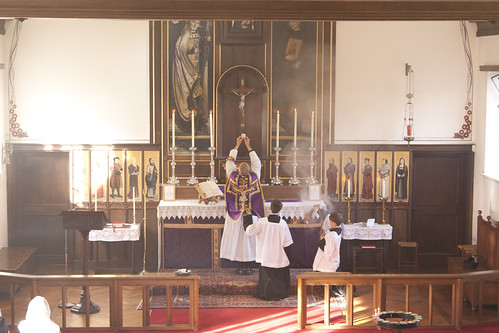 |
| Mass of reparation in Oxford: Votive Mass pro remissione peccatorum |
Christ also, the spotless Lamb, was disfigured, by his enemies. Isaiah says of Him in prophecy: 'there is no beauty in him, nor comeliness: and we have seen him, and there was no sightliness, that we should be desirous of him' (Is 53:2). But again, Christ's beauty is hidden, rather than lost.
What has happened to the Church in the last 50 years and more is a disfigurement, a disgrace. Like the Beloved of the Song of Songs, the Church has been cast out of doors without her veil:
'The watchmen that went about the city found me, they smote me, they wounded me; the keepers of the walls took away my veil from me.' (Song 5:7)
The defilement of the Church is real in one sense, and only apparent in another. As a human institution she can be wounded and shamed. As a divine institution she cannot. She is both human and divine, a mirror of Christ, who in His humanity truly suffered and died. This suffering was not unreal or superficial: the betrayal, the stripping naked, the being spat upon, the being tortured and killed. It is profoundly real and of the greatest significance. And yet Christ in his Divine nature, and the Church as the Mystical Body and Bride of Christ, is not defiled: such a thing is impossible. She remains beautiful, though blackened.
Wednesday, August 15, 2018
Appeal to the Cardinals over the Death Penalty
Update: there is a fuller list of signatories on the LifeSite story here.
Press Release: see the appeal letter on First Things
An unprecedented appeal to the College of Cardinals
Press Release: see the appeal letter on First Things
An unprecedented appeal to the College of Cardinals
In an unprecedented move, 45 Catholic academics and clergy have signed an Appeal to the Cardinals of the Catholic Church, urging the cardinals to tell Pope Francis that he must teach the authentic Catholic doctrine concerning capital punishment. The appeal follows an addition to the Church’s Catechism announced by Pope Francis on August 2nd. The new paragraph, which is confusingly worded, has been taken by many inside and outside the Church to say that capital punishment is intrinsically immoral, and must never be used. Such a teaching would run contrary to many passages in the Bible, and to the teaching of the Church down the centuries.
Catholics hold that while a pope has the right to clarify matters of faith and morals, he has no right to introduce new doctrines, or to contradict what the Church has always believed. They likewise hold that a pope must not seek to impose his private opinions on the faithful. The petition, which has been signed by professors of philosophy, theology, law, and history from Catholic institutions across the world, and by priests from several countries, calls on the cardinals to advise the pope that he must withdraw the offending paragraph, and that he must not ‘adulterate the word of God’. It also advises the cardinals that they have a serious obligation to warn the pope in this way, in order not to fail in their own duty toward God and the Church.
Monday, August 13, 2018
A note on babies in church, from 1921
 Every now and then the issue of babies crying in Mass comes up, and I thought this note from the early 20th century is worth preserving on this blog. The book from which this anecdote comes was published in 1921 (it is available as a reprint interestingly).
Every now and then the issue of babies crying in Mass comes up, and I thought this note from the early 20th century is worth preserving on this blog. The book from which this anecdote comes was published in 1921 (it is available as a reprint interestingly).Hat-tip to @AudreyFaithSeah on Twitter, who tells us
Timeless wisdom on preaching for hearing people (from a 1924 issue of “the Catholic Deaf-mute” newspaper).
I've written about children and babies in church here (on Geoffrey Hull claiming that babies should not be there at all), here (on 'crying rooms'), and here (FIUV Position Paper on children and the Traditional Mass).
Saturday, August 11, 2018
Come to Walsingham with Latin Mass Society!
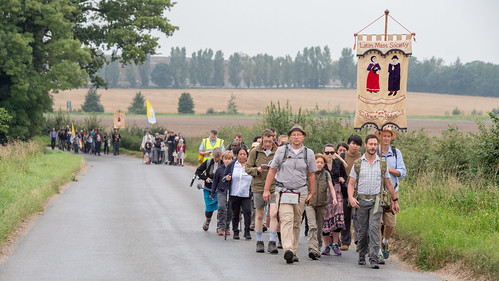
The LMS walking pilgrimage from Ely to Walsingham is taking place this month: we gather on the evening of Thursday 23rd August, and get to Walsingham on Sunday 26th August.
Book here.
We need volunteers as usual. If you have catering experience and would like to be a cook,
or have a private car / MPV / Landrover or the like and would like to drive a support vehicle,
email info@lms.org.uk with 'Walsingham Volunteers' in the subject line. These are non-walking roles, and there is no pilgrim's registration fee if you take part in these ways.
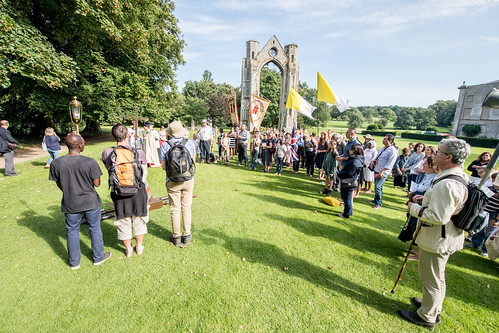
Support the work of the LMS by becoming an 'Anniversary Supporter'.
Friday, August 10, 2018
Thursday, August 09, 2018
Successful Latin Course from the LMS
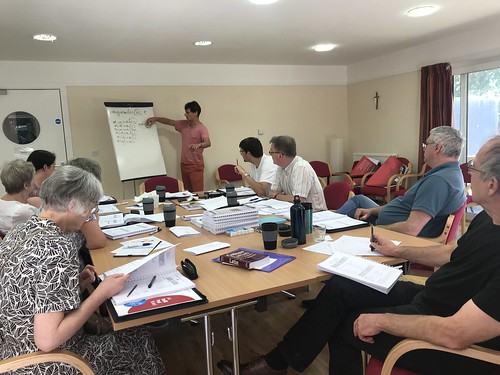
Last week the Latin Mass Society's residential Latin Course took place. We were close to capacity in the venue, the Carmelite Retreat Centre at Boars Hill near Oxford. With the help of Matthew Schellhorn and a number of singers who were present as students Sung Mass was celebrated each day and Compline twice. The two priests who attended as students took turns with Fr John Hunwicke, who was teaching, to celebrate the Sung Masses, as well as Low Masses before breakfast.
A few photos from the Roman Forum
Update: I see that the talks from the 2017 Roman Forum, including my own, are now available on the Keep the Faith website (they label it 'The Gardone Italian Symposium'). The whole set is here; mine is here. You can download the talks for $1.50, or the whole set of the Symposium for $18. Other speakers include Fr John Hunwicke, Prof Thomas Pink, Jamie Bogle, and Dr John Rao. I've mentioned on this blog the very interesting talks by Dr Clemens Cavellin, which touch on Yoga and the New Age.
Readers can get a 20% discount on downloading talks from the Keep the Faith website during August, using the code KTFSUMMER. There's masses of stuff there, including excellent talks from people now deceased, including Michael Davies, Hamish Fraser, Fr Paul Crane, and many others. They have the audio archive of Roman Forum symposiums going back years, and lots of other talks as well.
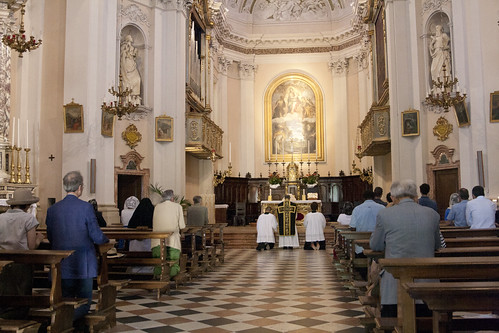
I gave a paper to the Roman Forum Summer Symposium this year, as I did last. Here are a few photographs.
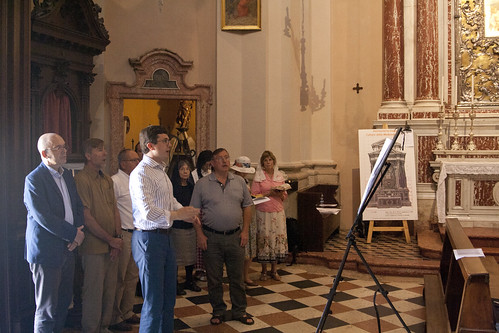
The symposium takes place in the town of Gardone Riviera, on Lake Garda. We use the beautiful church of St Nicholas there. Singing at the litugies is led by David Hughes (with the stripey shirt, above), a council-member of the Church Music Association of America.
Readers can get a 20% discount on downloading talks from the Keep the Faith website during August, using the code KTFSUMMER. There's masses of stuff there, including excellent talks from people now deceased, including Michael Davies, Hamish Fraser, Fr Paul Crane, and many others. They have the audio archive of Roman Forum symposiums going back years, and lots of other talks as well.

I gave a paper to the Roman Forum Summer Symposium this year, as I did last. Here are a few photographs.

The symposium takes place in the town of Gardone Riviera, on Lake Garda. We use the beautiful church of St Nicholas there. Singing at the litugies is led by David Hughes (with the stripey shirt, above), a council-member of the Church Music Association of America.
Sunday, August 05, 2018
The death penalty for the prestige of the Papacy
I was asked for a quote by a journalist when the story broke; it was used by LifeSite here. I paste my full statement below.
'Catechisms are not usually regarded as magisterial documents in their own right, but as systematic summaries of magisterial documents. Their value lies in their accuracy as reflections of the Church’s perennial teaching. With this change by Pope Francis, the Catechism of the Catholic Church has become less accurate than it was before, since it is clear from both the teaching and the practice of the Church over two millennia, and the clear and consistent message of Scripture, that capital punishment is not incompatible with the dignity of the criminal, nor with his redemption.
‘The text recently published also appeals to contingent historical circumstances, such as the modern penal system. Such considerations, which apply in any case to some countries more than to others, are irrelevant to the question of whether capital punishment is always and everywhere wrong.
‘This development brings to a head the troubling question of whether the Holy Father’s theological advisers see themselves as bound by the definitive statements of past popes, including the well-known account of capital punishment given by Pope Pius XII. If they are not bound by past popes, there is no reason why future popes should be bound by this statement, and indeed the authority of Pope Francis over Catholics today is called into question.’
(See also my post about the death penalty here.)
'Catechisms are not usually regarded as magisterial documents in their own right, but as systematic summaries of magisterial documents. Their value lies in their accuracy as reflections of the Church’s perennial teaching. With this change by Pope Francis, the Catechism of the Catholic Church has become less accurate than it was before, since it is clear from both the teaching and the practice of the Church over two millennia, and the clear and consistent message of Scripture, that capital punishment is not incompatible with the dignity of the criminal, nor with his redemption.
‘The text recently published also appeals to contingent historical circumstances, such as the modern penal system. Such considerations, which apply in any case to some countries more than to others, are irrelevant to the question of whether capital punishment is always and everywhere wrong.
‘This development brings to a head the troubling question of whether the Holy Father’s theological advisers see themselves as bound by the definitive statements of past popes, including the well-known account of capital punishment given by Pope Pius XII. If they are not bound by past popes, there is no reason why future popes should be bound by this statement, and indeed the authority of Pope Francis over Catholics today is called into question.’
(See also my post about the death penalty here.)
Friday, August 03, 2018
Historic crimes: repentance and reparation, Part 3
Reposted from September 2014
Guide to the series: Historic Crimes: Repentance and Reparation
Part 1
Part 2
Part 3
----------------------------------------------------------
In my last two posts I wrote about what our response can and should be to crimes, not personal crimes we have committed but those of the past (and for that matter of the present) which have, as it were, defiled the Church. Here I want to say a little more about the form reparation can take in practice.
Here, again, is something relevant from Shakespeare. In his The Rape of Lucrece, Lucrece confesses her rape by Tarquin to her husband and father, and then commits suicide in front of them, plunging a knife into herself. Shakespeare describes what happens to her blood.
Guide to the series: Historic Crimes: Repentance and Reparation
Part 1
Part 2
Part 3
----------------------------------------------------------
In my last two posts I wrote about what our response can and should be to crimes, not personal crimes we have committed but those of the past (and for that matter of the present) which have, as it were, defiled the Church. Here I want to say a little more about the form reparation can take in practice.
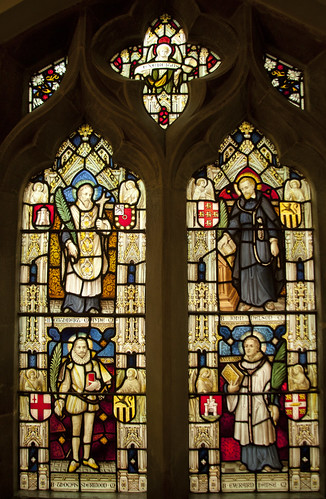 |
Clockwise from top left: St Cuthbert Mayne, Bl John Nelson SJ,
who forgave the Queen as he was disembowelled, Bl Everard Hanse,
|
And bubbling from her breast, it doth divideThe idea here is that she did have some measure of guilt for what had occurred, and her death is a kind of expiation. It makes most sense, at least to a Christian reader, on Clare Asquith's reading: that Lucrece represents the English community, which in part remained faithful and in part apostatised under pressure from the Protestant Revolt. The shedding of the blood of the martyrs, which Shakespeare's description of Lucrece's suicide suggests, was a kind of expiation of the apostasy. The faithfulness of few, a faithfulness to death, in this way made up for the faithlessness of others. It makes the reconciliation of the whole country, the 'late-sacked island', more possible.
In two slow rivers, that the crimson blood
Circles her body in on every side,
Who, like a late-sack'd island, vastly stood
Bare and unpeopled in this fearful flood.
Some of her blood still pure and red remain'd,
And some look'd black, and that false Tarquin stain'd.
Wednesday, August 01, 2018
Historic crimes: repentance and reparation, Part 2
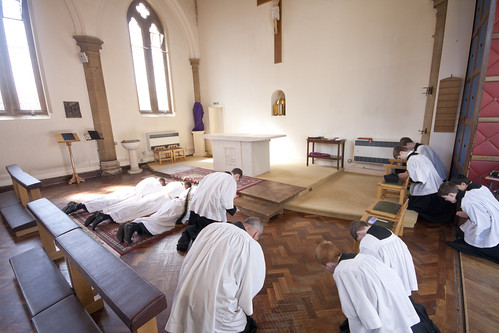 |
| Good Friday Liturgy with the FSSP, Reading |
Part 1
Part 2
Part 3
-----------------------------------------------------
In my last post, I suggested that what may be necessary in dealing with the crimes of our predecessors in the Church are two things: compensating the victims, and repudiating any ideological justification put forward for the crimes. My examples were anti-Semitism and paedophilia.
My discussion of past crimes has, deliberately, focused on issues where the crimes clearly really did take place, and clearly are crimes. I don't want to give the impression that I want to accept every accusation against Catholics as true: that will lead to injustice just as surely as treating every accusation as false. Nor am I, by any means, inclined to say that everything which has been done by Catholics down the centuries which does not meet the approval of modern liberals is a crime. Again, the hysteria surrounding the investigation of the recent past in Ireland shows that a lack of historical perspective, and extrapolation from insufficient information, can distort the picture to the extent that good people end up being depicted as monsters. Let us hope that the apology issued by the Associated Press news service over their own reporting of the Tuam excavations represents the high-water mark of this lunacy.
Plenty of crimes, however, are real enough; there is really no need to gild the lily. Looking at the child abuse scandal, for example, it is increasingly clear that it was a problem which affected a lot of institutions at a particular period of time, but that does absolutely nothing to excuse its presence in the Church. The seriousness with which this plague infected the Church is mind-boggling, and one may be excused for asking: what can possibly wash this from us?
Subscribe to:
Posts (Atom)

